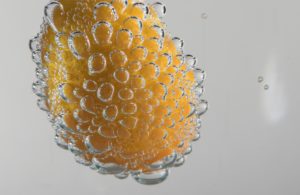
Stomach Acid Basics
Stomach acid causes heartburn.
Long-term reflux problems leads to a GERD diagnosis.
Stomach acid has a pH of 2.
Low pH = acid; High pH = base
Stomach acid is Hydrochloric acid (HCl)
Some Biochemistry
The molecules of the acid like to spend their time joining together and breaking apart. So by attaching to something else instead of each other is how it can be dangerous but also how it helps digest food quickly.
Your stomach is designed to hold this strong acid safely.
There are pumps in the cells of the lining of your stomach that produce the acid.
Proton pumps work kind of like a water wheel – they move protons from inside the cell to outside to the stomach cavity.
Hydrogen atoms are made up of 1 proton (positive charge) and 1 electron (negative charge). So if you take the electron away from hydrogen, you are left with a proton with a positive charge.
Another process that helps create acid in the stomach relies on histamines.
They are not quite the same as the histamines that you hear about in relation to allergies. But there is a particular type of histamine that is only in your stomach.
Acid-reducing Medications
There is a class of medications for reflux called Proton Pump Inhibitors (PPI). These medications turn off the pumps so they pump less protons into the stomach.
The medications for the histamine process are called Histamine 2 Receptor Blocker (H2RB).
H2RB’s work faster than PPI’s. Just like you can take an antihistamine and it block histamines causing allergies in just a dose or two, H2RB’s can work as fast as one or two doses. That is why they are advertised to treat heartburn after you eat or to help prevent heartburn before you eat.
PPI’s take up to 2 weeks to reach maximum effect.
The third option for heartburn are your antacids. They are bases that go into your stomach acid and help neutralize it.
OTC Medications (by class)
Antacids: Tums, Rolaids, Maalox, Mylanta – fastest
H2RB’s: Pepcid, Zantac, Tagamet – all have generics, all OTC
Tagamet can have drug-drug interactions with other prescription medications, so caution is advised.
PPI’s: Prilosec, Prevacid, Nexium – some generic, newly OTC – slowest
Cautions
The downside to having reflux medications available OTC and people having the opportunity to self-treat is if there are any cellular changes in your esophagus.
Your esophagus is not designed to be in contact with that level of acid. As those cells are injured, they eventually change and can become cancer.
Fun Tidbit
Just like the cells of your skin are epithelial cells and their job is to keep the inside things in and the outside things out. Your digestive tract is also lined with epithelial cells. So technically the food you eat doesn’t go inside your body, it just moves through this tract that is “outside turned in”.
Holla
@steve_tessler‘s question: After he eats, he coughs for 30 minutes, and sometimes sneezes. Is this considered GERD? Cannot eat nuts or seeds due to diverticulitis. If he sits and rests it doesn’t get so bad, but if he has to be active right after a meal, it is.
Recommendation: try a H2RB morning and night and see if it contains the acid after meals. The next option could be a slight food allergy, possibly gluten, so cutting out certain foods would be necessary.
Connect with me
Support us on Patreon
*NEW* Join the Pharmacist Answers Podcast Community on Facebook
Subscribe: iTunes, Stitcher, GooglePlay, TuneIn Radio
